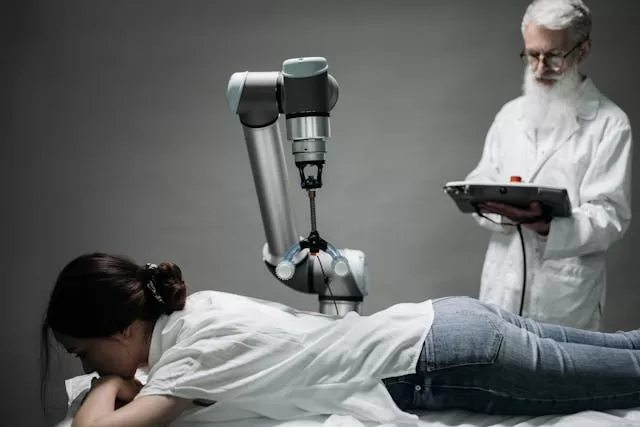
The future of AI in healthcare is transforming at a rapid pace, and CES 2025 provided an eye-opening glimpse into how technology will reshape medicine. With revolutionary innovations and insightful discussions, the event highlighted key trends and challenges in integrating AI into healthcare systems. Here’s everything we learned about the future of AI in healthcare from CES 2025.
Table of Contents
1. AI-Driven Diagnostics Are Becoming a Reality
The future of AI in healthcare is heavily centered on diagnostics. At CES 2025, companies unveiled AI systems capable of detecting diseases like cancer and heart conditions with unprecedented accuracy.
These AI tools analyze medical imaging, such as MRIs and CT scans, in a fraction of the time it takes human specialists.
By leveraging AI for diagnostics, doctors can ensure faster and more accurate treatment plans.
2. Personalized Medicine Is Advancing Through AI
AI-driven personalized medicine took center stage at CES 2025, emphasizing how tailored treatments will define the future of AI in healthcare. Machine learning algorithms are now capable of analyzing genetic data to design individualized care plans.
This approach enables precise treatments for conditions like diabetes, cancer, and autoimmune diseases.
Patients can expect fewer side effects and better outcomes as AI fine-tunes medications and therapies to their unique needs.
3. Telemedicine Platforms Are Evolving with AI
Telemedicine has grown immensely, and the future of AI in healthcare includes enhancing these platforms with advanced algorithms. CES 2025 showcased AI-powered telehealth tools that analyze patient symptoms and medical histories in real-time.
These tools improve the accuracy of remote consultations and provide actionable insights to healthcare providers.
AI integration ensures that telemedicine is more accessible and reliable for patients across the United States.
4. Wearable Devices Are Becoming Smarter
The future of AI in healthcare was evident in the advancements of wearable devices at CES 2025. Smartwatches and fitness trackers are now equipped with AI algorithms that monitor heart rate, sleep patterns, and stress levels more accurately.
These devices alert users to potential health issues before symptoms become severe, enabling early intervention.
AI-powered wearables are bridging the gap between preventive care and real-time health management.
5. Robotic Surgery Is Gaining Precision
Robotic surgical systems have been a cornerstone of AI in healthcare, and CES 2025 highlighted their next-generation capabilities. Robots equipped with AI algorithms can now assist surgeons with greater precision and minimal invasiveness.
These systems reduce recovery times, lower the risk of complications, and improve surgical outcomes for patients.
The future of AI in healthcare will see robotic surgery becoming more common in hospitals nationwide.
6. Mental Health Apps Are Leveraging AI
Mental health was a major focus at CES 2025, with AI-driven apps offering new ways to address emotional well-being. The future of AI in healthcare includes tools that detect signs of anxiety, depression, and PTSD through speech patterns and behavioral analysis.
These apps provide users with personalized coping strategies and connect them with licensed therapists when needed.
By integrating AI, mental health care is becoming more accessible and effective for millions of Americans.
7. AI Is Enhancing Drug Development
The pharmaceutical industry is leveraging AI to accelerate drug discovery, as showcased at CES 2025. The future of AI in healthcare includes machine learning models that analyze vast datasets to identify promising compounds.
These AI systems significantly reduce the time and cost required to bring new medications to market.
This innovation is paving the way for faster development of life-saving drugs for diseases like Alzheimer’s and cancer.
8. AI Is Improving Emergency Response Systems
Emergency care is also benefiting from the future of AI in healthcare. At CES 2025, companies demonstrated AI tools that optimize ambulance routes and predict hospital resource needs during crises.
These systems ensure that patients receive timely care, even in high-pressure situations.
AI in emergency response is streamlining operations and saving lives across the United States.
9. Virtual Reality Therapy Is Gaining Momentum
The intersection of AI and virtual reality (VR) was another highlight of CES 2025. The future of AI in healthcare includes VR therapy sessions guided by AI to treat conditions like phobias, chronic pain, and rehabilitation needs.
These immersive experiences provide patients with tailored treatments that adapt to their progress.
AI-powered VR is transforming how healthcare providers approach therapy and rehabilitation.
10. AI Is Addressing Healthcare Inequities
Healthcare disparities are a pressing issue, and CES 2025 demonstrated how the future of AI in healthcare could address these challenges. AI systems are being designed to identify and mitigate gaps in care, especially in underserved communities.
These tools analyze social determinants of health and recommend targeted interventions.
By prioritizing equity, AI is making healthcare more inclusive and accessible.
11. Data Privacy and Security Are Becoming Priorities
With the rise of AI, data privacy and security emerged as key themes at CES 2025. The future of AI in healthcare depends on robust systems that protect sensitive patient information.
Companies are developing encryption methods and compliance frameworks to ensure data integrity.
Patients can trust AI-driven systems as privacy concerns are addressed comprehensively.
12. Collaboration Between Humans and AI Is Increasing
The future of AI in healthcare is not about replacing human professionals but enhancing their capabilities. CES 2025 emphasized the importance of collaboration between doctors and AI systems.
AI assists by handling repetitive tasks, allowing healthcare providers to focus on patient care.
This synergy ensures better outcomes and a more efficient healthcare system.
These insights from CES 2025 underscore the transformative potential of AI in healthcare. For more details on AI’s role in revolutionizing medicine, visit AI Med for expert analyses and updates.
